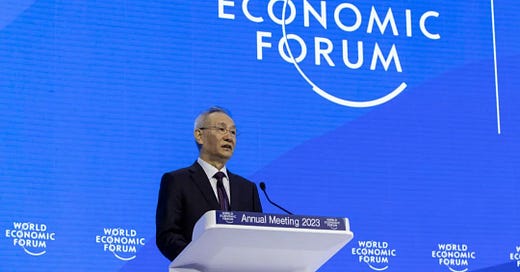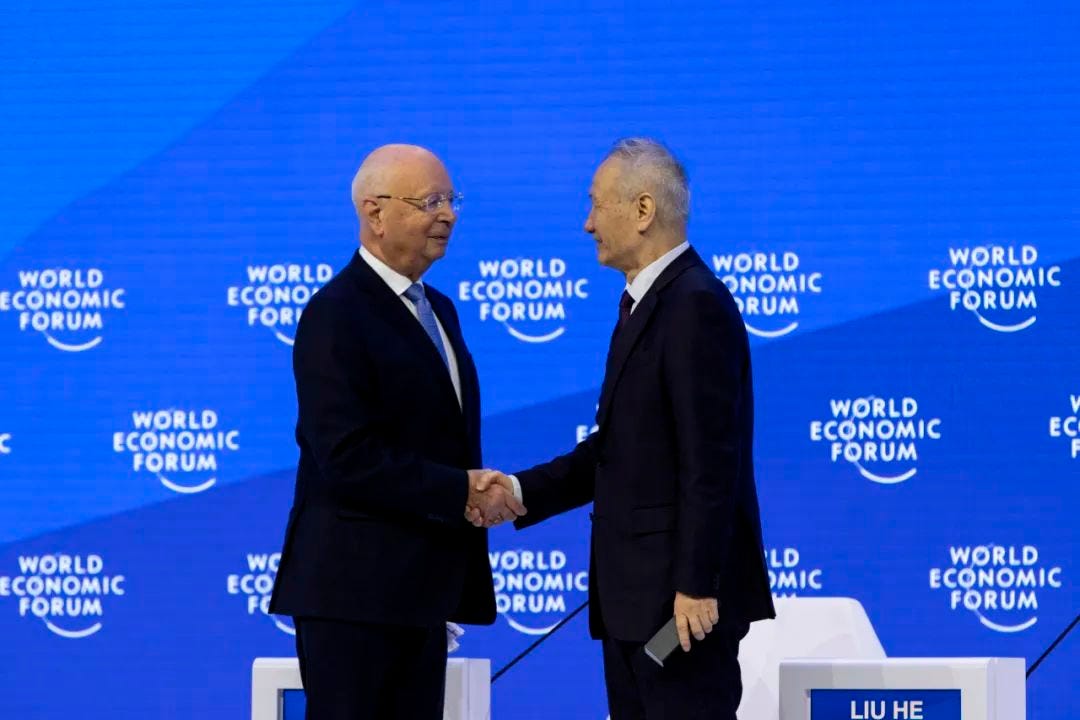Vice Premier Liu He reiterates support for private economy, openness in World Economic Forum Annual Meeting
Full translation of the respected economic official's speech in Davos, Switzerland, where he met "many old friends"
A few hours ago, China’s Vice Premier Liu He gave a speech at the Annual Meeting of the World Economic Forum (WEF) in Davos, Switzerland.
This newsletter provides a summary and then the full translation of the respected economic official and friend of many in international business and finance.
The annual gathering of global elites is a preferred forum for China to highlight its openness to the world. In 2017, President Xi Jinping delivered a keynote speech that The New York Times characterized as In Era of Trump, China’s President Champions Economic Globalization.
Almost three years after China remained largely secluded in terms of travel due to covid, Liu He, once a mid-career student at Havard Kennedy School, reassured the international community that “China's door will only be opened wider and wider.” Well, on a literal level, that’s true given China’s recent elimination of inbound quarantine as a part of its abrupt and dramatic paradigm shift on covid control.
Liu also messaged that the Communist Party of China (CPC) unswervingly supports the development and growth of the private economy and that its pursuit of “Common Prosperity,” a vaguely-defined term that has stoked concerns for a possible return to egalitarianism, private entreprenurs and international businesses have little to worry about, as “entrepreneurs, including foreign ones, will play an important role as engines because they are the key elements of wealth creation in society.”
“Some people say that China would engage in a planned economy. That is absolutely impossible,” Liu said.
The No.1 priority of the CPC remains economics, Liu said, and China’s “socialist market economy” will let the market play the decisive role in allocating resources. Notably, against the foreign observation that 'Security' Eclipse 'Economy' in Historic Shift, the term “security” is nowhere to find in his speech (except on international macroeconomic governance, perhaps referring to the consequences of the war in Ukraine).
Liu He also gave a detailed analysis of China’s battered real estate industry, admitting that “We believe that risks in the real estate sector, if not handled properly, can easily trigger systemic risks.” He laid out how China has tried to turn it around - stabilize expectations, facilitate financing, and relax purchase restrictions of apartments.
His description of the housing sector as “a pillar industry of China's national economy” is certainly music to many developers who default on their bonds. But not every one of them should expect a state bailout, as “care should be taken to address the relationship between systemic risks and moral hazards. "
There was one apparent but slight jab at the United States without naming its name: “We call on major powers to take the negative externalities on emerging and developing economies into serious consideration when they raise interest rates, to prevent aggravating debt and financial risks.”
If you follow China closely, it’s not a secret that China is worried about the Fed’s hike of interest rates, as I covered in Pekingnology over a year ago
(Sign up for Pekingnology for broader discussion’s on China from within China.)
China did not cause African debt distress in most cases, but it is key to finding a solution. (That’s from Chatham House.) Liu He says China has agreed to “work with all parties to promote the resolution of the debt problems of some developing countries.”
Interestingly, Liu says since covid China “recognized that there is a link between climate change and public health crises, which awaits effective international cooperation." He didn’t elaborate on that.
Last but not least, Liu echoed the theme of this year’s Davos Forum - that’s what the Chinese call the annual WEF meetings in the Swiss resort - by repeatedly citing “Cooperation in a Fragmented World,” underscoring Beijing’s appreciation of Professor Klaus Schwab’s enduring statecraft.
— Zichen Wang, Center for China and Globalization (CCG)
Below is a full translation based on the Chinese-language transcript published by the WEF on its WeChat blog.
Contributors to the translation include Yuxi HAN, a master’s student at Sun Yat-sen University, and Xinyi ZHANG, a master’s student at the University of Hong Kong.
中华人民共和国国务院副总理刘鹤在世界经济论坛2023年年会上的特别致辞(全文)
Special Message from Vice Premier Liu He of the State Council of the People's Republic of China at the World Economic Forum 2023 Annual Meeting (Full Text)
Distinguished President Schwab, ladies and gentlemen, friends.
Good morning, everyone! Thank you very much, Mr. Schwab, for the invitation and for giving me the opportunity to come to beautiful Davos again. I last attended the Davos Forum in 2018. Five years have passed, we have experienced various unexpected events, and the world's political and economic landscape has changed profoundly. Against this backdrop, it is significant that the theme of this year's annual meeting is Cooperation in a Fragmented World.
Mutual understanding is an important prerequisite for strengthening cooperation. No matter how much online communication is available and how advanced the technical means are, they cannot replace direct meetings. I have met with many old friends in the past two days and feel very warm-hearted. In 2022, China successfully completed an important domestic political agenda, successfully convened the 20th Communist Party of China (CPC) National Congress, elected a new central leadership with President Xi Jinping as the core, and drew a grand blueprint for the Chinese path to modernization in the next five years and beyond.
We held China's annual Central Economic Work Conference not long ago to make plans for economic work in 2023 in accordance with the spirit of the 20th CPC National Congress. Looking at the situation in 2022, China's economy grew by 3 percent, maintaining stable employment and stable prices, with an urban survey unemployment rate of 5.6 percent, a consumer price index of 2 percent, and a current account surplus of slightly more than 2 percent of GDP.
In 2023, we will adhere to the general keynote of seeking progress in a stable manner, continue to implement a proactive fiscal policy and a prudent monetary policy, strive to maintain reasonable economic growth, and keep prices and employment generally stable. We will focus on expanding domestic demand, promoting a smooth circulation in the supply chain and the industrial chain, supporting the healthy development of the private economy, deepening the reform of state-owned enterprises, welcoming more foreign investment to China, and preventing and resolving economic and financial risks.
We believe that with efforts, China's economy will achieve an overall improvement in 2023, and it is probable that growth will reach normal levels. Imports are expected to increase significantly this year, enterprises will increase their investment efforts, and residents’ consumption will return to normal.
Looking back at the past decade, China's GDP increased from 54 trillion yuan to 121 trillion yuan, average life expectancy increased from 74.8 years to 78.2 years, and its contribution to world economic growth reached about 36%.
To be able to achieve such achievements, there are at least five lessons:
First, we must adhere to development as the first priority and economic development as the center. In the new situation, it is necessary to implement the new development concept of innovation, coordination, green, openness, and sharing in a complete and accurate manner to vigorously promote high-quality economic development.
Second, we must adhere to the direction of socialist market economy reform. Give full play to the decisive role of the market in allocating resources and better play the role of the government. Some people say that China would engage in a planned economy. That is absolutely impossible. We must unswervingly deepen the reform of state-owned enterprises, unswervingly support the development and growth of the private economy, promote fair competition, oppose monopoly, and promote the entrepreneurial spirit.
Third, we must adhere to the expansion of all-round opening to the outside world. Openness to the outside world is China's basic national policy, openness is an important driving force in promoting reform and development and promoting China's economic progress. China's door will only be opened wider and wider.
Fourth, we must adhere to the rule of law. Protect property rights and intellectual property rights in accordance with the law, and create a market-oriented, law-based, international business environment. Whether it is government action or market action, it must operate on the track of the rule of law.
Fifth, we must adhere to innovation-driven development. Vigorously promote innovation, develop education, attach importance to the enhancement of human capital, pay attention to the triangular cycle of finance, technology, and industry, and strive to improve labor productivity.
These experiences are important practices we have been pursuing since the reform and opening up and must be adhered to in the long term without wavering.
Here, I would like to briefly introduce three more issues.
First, China's prevention and resolution of financial risks, especially those related to the real estate industry; second, China's consideration of promoting a dual-circulation economy; and third, China's consideration of promoting common prosperity.
Some financial risks have emerged in China in the past five years, mainly due to a combination of the macroeconomic downturn, lax financial supervision, blind expansion of operating entities, and insider control. We have fought a hard battle, decisively disposing of a number of high-risk large conglomerates, disposing of high-risk small and medium-sized financial institutions, disposing of non-performing assets, reducing the size of shadow banking, and dealing with abnormal fluctuations in the capital market.
As a result of our efforts, China's financial system has generally remained sound and has held the bottom line of no systemic risk. We are working on the Financial Stability Law to provide legal protection for the next step in resolving financial risks and maintaining financial stability.
The real estate industry is a pillar industry of China's national economy. Real estate-related loans account for nearly 40% of bank loans, real estate-related revenues account for 50% of comprehensive local government financial resources, and real estate accounts for 60% of urban residents' assets.
Since the second half of 2021, China's real estate market has seen a sharp decline in prices and sales, with real estate companies generally experiencing poor liquidity and deteriorating balance sheets and individual leading companies facing significant risks.
We believe that risks in the real estate sector, if not handled properly, can easily trigger systemic risks, and timely intervention is necessary. Still, care should be taken to address the relationship between systemic risks and moral hazards.
First, stabilize expectations by protecting contracts and property rights. For more than 2,600 undelivered projects involving 1.88 million residents nationwide, we started with [the initiative of] "guaranteed delivery of residential buildings (already paid for by homebuyers)" to avoid market panic. Secondly, we improved the liquidity of real estate companies by injecting new sources of capital, including loans from banks, guarantees for debt issuance to real estate companies, and promotion of equity financing. Third, we relaxed some restrictive measures taken during the overheated period of the real estate market to expand effective demand and make real estate companies capable of generating revenue.
Through these efforts, the relationship between market supply and demand began to improve significantly. In the future, China is still in the stage of fast urbanization, and the huge demand potential will provide strong support for the development of the real estate industry.
Currently, China is accelerating the building of a new development paradigm where domestic and foreign markets boost each other, with the domestic market as the mainstay. Domestic circulation focuses on expanding domestic demand, improving the industrial system, forming a consumption-driven growth model, and pushing the economy to achieve rebalancing.
This logic has been the international consensus since 2008. A smooth domestic circulation requires strengthening the international division of labor and cooperation, expanding foreign trade, and utilizing foreign investment. The new development paradigm is a dual circulation of domestic and foreign markets. China's basic national conditions dictate the need to open up to the outside world and continuously improve the quality and level of opening up to the outside world. We oppose unilateralism and protectionism and hope to strengthen international cooperation across the board to jointly maintain the stability and development of the world economy and promote economic re-globalization.
China has built a society of moderate prosperity in all respects, and achieving common prosperity is an important social development goal we have proposed, as well as a historic task to achieve long-term stability in China. This is a long-term task that needs to be achieved gradually and cannot be achieved overnight.
When we talk about common prosperity, we emphasize avoiding polarization. It ultimately relies on common development and everyone's hard work and diligence to get rich. It will never be egalitarianism (where everyone is rewarded equally no matter what) and welfarism (where the state provides excessive welfare benefits to the citizens). As China develops, the national wealth of the entire population will continue to increase, but there will be certain differences in people's income and affluence in all cases. In other words, everyone is equal in front of opportunities, but the results are still different. In the historical process of promoting common prosperity, entrepreneurs, including foreign ones, will play an important role as engines because they are the key elements of wealth creation in society. Without the gradual accumulation of wealth, common prosperity will become a river without a source and a tree without its roots (groundless).
Ladies and gentlemen, friends
The theme "Cooperation in a Fragmented World" is highly relevant to our times. President Xi Jinping pointed out that at present, the changes in the world, in the times, and history are unfolding in an unprecedented manner. The world is once again standing at the crossroads of history, and the way forward depends on the choice of all people.
On how to solve the problem of world cooperation, I would like to share three observations.
First, adhere to the right principles and maintain an effective international economic order. In the face of the new situation, the traditional way of thinking cannot provide a way out, and we must abandon the Cold War mentality and understand the nature of things from the perspective of 物质二相性 material duality. We should aim at building a community with a shared future for mankind and join hands to address global challenges. We believe that a proper international economic order must be jointly maintained and that the economic principles remain unchanged when it comes to the appropriate division of labor, encouraging competition, opposing monopoly, protecting property rights and intellectual property rights, promoting entrepreneurship and the free flow of factors of production, insisting on fair distribution, improving social safety nets and maintaining macroeconomic stability. Governments should play a role in core issues. In the face of temporary resistance and regression, we should be brave enough to stick to the truth, respect the laws and use pragmatic and direct solutions to solve complex problems.
Second, we should strengthen international macro policy coordination and balance the relationship between inflation control and stable growth. The current coping strategy of some countries is 通胀-加息-衰退-复苏 "inflation - raise interest rates - recession - revive". It should be noted that the current round of inflation is driven by multiple factors, and the causes are complex. In addition to demand-side factors, we should work on the supply and demand side at the same time, simultaneously repair the industrial chain and supply chain, and attach great importance to energy security and food security. Thus we must promote international cooperation to maintain peace and jointly cope with common challenges. We call on major powers to take the negative externalities on emerging and developing economies into serious consideration when they raise interest rates, to prevent aggravating debt and financial risks. We also agree to work with all parties to promote the resolution of the debt problems of some developing countries.
Third, we should actively address global climate change. Most countries in the world have recognized the urgency of climate governance and the need to take joint action. After the outbreak of Covid-19, we recognized that there is a link between climate change and public health crises, which awaits effective international cooperation. We will adhere to our commitments to the international community, actively promote international cooperation in the field of climate change, jointly and effectively address serious challenges posed by climate change, and promote building a community with a shared future for mankind.
Cooperation in a Fragmented World is a real problem we face. We should face the current situation of division frankly, deeply analyze its causes, advocate positive-sum games, find common ground where it is possible to expand cooperation, explore effective mechanisms to expand cooperation, and firmly maintain world peace.
Thank you very much for providing us with such an opportunity at this Davos Forum. I sincerely wish this forum great success and that it can contribute to international peace and cooperation in a fragmented world.
Thank you all for listening. (Enditem)
Contributors to the translation include Yuxi HAN, a master’s student at Sun Yat-sen University, and Xinyi ZHANG, a master’s student at the University of Hong Kong.
Sign up for Pekingnology for broader discussion’s on China from within China.












